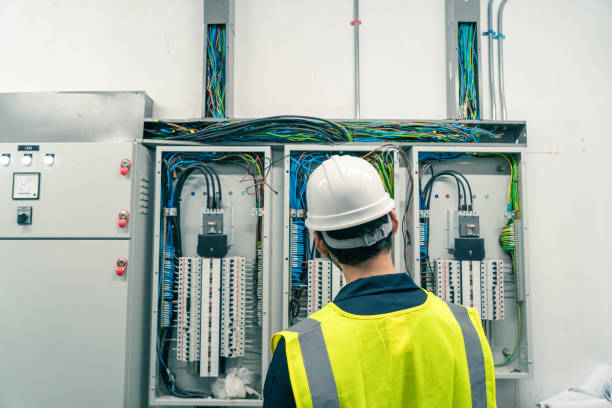The Critical Role of Industrial Electrical Contractors in Modern Manufacturing

Step inside any modern factory and it feels like stepping into the future—machines moving in sync, robotic arms assembling parts, conveyor belts running nonstop. Behind that smooth rhythm lies one constant: electricity. It’s the heartbeat of manufacturing. Without it, production halts. And this is exactly why Industrial Electrical Contractors in London play such a vital role. They don’t just wire machines; they keep entire industries alive.
Why Manufacturing Relies So Heavily on Electrical Work
Manufacturing plants today are nothing like those greasy, gear-driven workshops from old photos. They’re advanced, automated, and run on intricate systems powered by carefully designed electrical networks. Every robot, every control panel, every safety mechanism depends on precision wiring and constant upkeep.
One power surge or a faulty connection can stop the line. And stopping the line? That’s not just downtime—it’s missed delivery dates, wasted materials, and, frankly, a lot of angry phone calls from clients. The people who prevent these messes are the contractors who design robust systems and maintain them like clockwork.
More Than “Just Fixing Wires”
Here’s a misconception: some folks think industrial electrical contractors are just glorified repair techs. Call them when something breaks, problem solved. Not true. Their work often starts long before a machine is even installed.
They calculate loads, design power distribution networks, and integrate safety protocols like automatic shutdowns. They’re the ones who make sure when the lights flicker, your machinery doesn’t burn out. And with sustainability being a hot topic, they’re also the ones installing low-energy systems, LED lighting, or renewable energy tie-ins.
A Story That Hits Home
Let me share this quick one. A close colleague worked in a packaging plant where the main power board failed one night. Everything went black. The machines froze mid-operation. Workers had to scramble out of the dark, dodging equipment. Turned out the panel hadn’t been inspected for years. The kicker? That inspection would’ve cost less than one hour of lost production. That incident showed me just how much preventive maintenance matters.
Local Knowledge Counts
Now, here’s something businesses often overlook: local expertise. You might think an electrician is an electrician, but industrial projects demand specialists who understand regional codes and standards. Hiring someone who knows the lay of the land makes all the difference.
For example, a business looking for an Electrician in Hornchurch isn’t just after someone with tools—they’re after someone who understands both the complexity of industrial systems and the compliance rules specific to that area. It’s not just about wiring; it’s about avoiding regulatory headaches later.
Old-School Skills Meet New Technology
Industrial electrical work isn’t frozen in time. It’s evolving just as manufacturing is. Contractors today mix hands-on skills with digital solutions. Predictive maintenance using sensors, real-time monitoring, IoT-enabled machines—all of that is part of the job now.
Imagine being able to spot a motor that’s about to overheat, before it does, thanks to a monitoring system installed by your contractor. That’s not just convenience. That’s the difference between a quick fix and a costly shutdown.
Safety and Compliance: The Unseen Armour
Another thing worth highlighting is compliance. Nobody sees it day to day, but it’s always there. Proper grounding, fault detection systems, fire-proof installations—they don’t grab attention until something goes wrong. And if something does go wrong without them? Well, you don’t want to find out.
Contractors ensure that factories not only run efficiently but also meet every safety standard. In the UK, regulations aren’t optional—they’re law. Having the right electrical partner ensures that boxes get ticked, audits go smoothly, and workers stay safe.
The Future of Manufacturing Needs Smarter Contractors
We’re racing into the age of “smart factories.” Think robotics managed by AI, interconnected machines, and energy grids that practically talk to each other. Does that mean the role of industrial electricians shrinks? Nope. If anything, it expands.
Tomorrow’s contractors will need to be part electrician, part IT engineer, part strategist. Cybersecurity, automation, renewable integration—it all connects back to electricity. The ones who can adapt to that landscape will be indispensable.
Why Cutting Corners is a Risky Gamble
Here’s the temptation many businesses fall into: cost-cutting. “Maybe we don’t need the best contractor. Maybe the cheaper option works.” But when you gamble with electrical systems, the stakes are huge. Faulty installations don’t just cause downtime—they risk fires, injuries, and expensive lawsuits.
Think of it this way: would you trust a random mechanic with a Boeing jet engine? Of course not. So why hand over your factory—the core of your livelihood—to anyone less than a qualified, experienced contractor?
Wrapping It Up
Factory moves on efficiency, accuracy and reliability. But none of this is safe or maintained without the backbone of electrical systems. Industrial electrical contractors in London are not background players-they are central to maintaining manufacturing competitiveness, safety and forward-looking. So next time you see resonating with a factory, leave an idea for the people behind the curtain. They cannot make headlines, but without them, the show will stop immediately.




